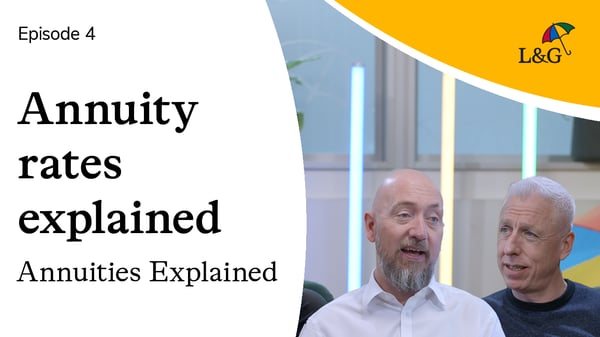What are the latest annuity rates?
We live in difficult financial times. The cost of living crisis is hitting us all. But if you’re nearing retirement or already retired, the current economic clouds could have a very important silver lining – annuities.
Once you’ve bought an annuity, it’s a very stable way of funding your retirement. They’re one of the few ways you can get a guaranteed retirement income for the rest of your life. Annuity rates can constantly change but yours will be locked in when you choose to buy your annuity.

05:44
Barry: Hi, John. Great to see you. You've been brilliant so far. Helped me understand the difference between drawdown and annuity, my retirement income options. How do you calculate the guaranteed income option?
John: When we calculate your retirement income we need to decide on something called an annuity rate. Now annuity rate is a way of expressing your income as a percentage. So for example, if we decide the annuity rate is 6%. You give us £100,000, we would give you £6,000 back as an income. So 6% of £100,000. And that's guaranteed income. As we've mentioned before that will last for the rest of your lifetime. And we'll continue to pay it for as long as you live.
Barry: Right. That's useful, John. So how do annuity rates actually work then?
John: Well, we take into consideration a number of things, Barry. For example, what's happening in the economy at the time. So certain things like interest rates are very closely linked with annuity rates. But also on a more direct personal level, we will look at the options you've chosen for your annuity and how you want your income paid out, but also your health and your lifestyle factors will feed into the annuity rate as well.
John: So we take all these things into consideration for coming up with a figure that is personal to you. So John, what makes an annuity such a stable choice. Well once your annuity rate is set, it can't change. So the amount of income that we've agreed to pay you, we'll continue to pay you for the rest of your life or for a fixed term annuity, for the period that you've selected. And also if you've been in poor health, we can then set that as an enhanced annuity and you can actually get more income as a result. If you have medical conditions we can certainly price the annuity to reflect that.
Barry: So, John, looking at the current market, what's the state of annuity rates now? Have they risen, have they dropped, what's been going on?
John: Well as interest rates went up, so did annuity rates, they're fairly closely aligned. And in 2022, they reached a 14-year high. So, a good time to buy annuities was then and they've remained at a relatively high level since. But that's not to say that annuity rates won't drop. Again, as the economy changes, they can change as well. And annuities are closely linked to, as I said, interest rates but also to government bonds as well. So pricing of those will change. Again that will affect the annuity rate. And our latest annuity rates are published on our website, so you can find them there.
Barry: So easy for me to see.
John: Yeah.
Barry: Brilliant. So I'm going to ask a selfish question now, really. What does a good annuity rate mean to me personally?
John: Good for you, Barry, means that it's the annuity rate that takes into consideration your personal situation. So we will look at the choices that you've made. We will look at your medical history, your lifestyle history. And we will create Barry's own annuity rate. So it's very specific to you. And that annuity rates is then guaranteed. It will be paid for the rest of your life and will always represent the choices that you've made.
Barry: Okay, I like that. Barry's own annuity rate. I can see that - I hope it's on the top of the document. So how do I go about getting Barry's annuity rate?
John: Well, first of all, I would say you need to shop around Barry to make sure you're getting the best rate for you. So, providers don't all offer the same rate. Some may offer more income for you in retirement, but then you can also, apply through our website. If you want to take an annuity with Legal & General, and we will actually tell you if we're the best or if you can get better income elsewhere. One thing that's worth considering, though, is that when you take out a annuity, if you were to die soon after taking that out then you won't get back all the money that you've paid into it. So that's one consideration to have.
Barry: Well, it's good to know these things. It's good to know the restrictions and the positives. And that's been great again John. I'm learning more every time I speak to you.
John: That's good Barry, thanks very much.
Barry: Thank you.
John: To find out your personal annuity quote, go to the Legal & General online quote and apply journey. And also if you liked the video, remember to like, share and subscribe.
What is an annuity rate?
An annuity rate is the measure of how much income you get from your annuity.
Annuity rates are usually given as an annual percentage of the amount your annuity costs. So for example, imagine you spend £100,000 on an annuity. If it has a:
- 2% rate, it will pay you £2,000 a year
- 6% rate, it will pay you £6,000 a year
- 10% rate, it will pay you £10,000 a year
The actual rate you get will depend on several factors, including:
- Your own personal circumstances. Your age, state of health or even where you live can make a difference to the rate you’re offered.
- How annuity rates are doing in general and which particular provider you choose. Different providers offer different rates, so it’s always worth shopping around.
- What sort of product and options you go for. You might choose a rate that grows with inflation or want to make sure that payments keep going to a loved one if you die, which will both mean your starting income is lower.
- When you’re choosing your annuity, it’s very important to make sure that you make the right choices. That’s because once your annuity begins, your rate and any options you’ve chosen are fixed and can’t change.
What makes annuities so stable?
Once you’ve locked in your annuity rate, the income you’ll get is completely secure. Your annuity will pay out for the rest of your life – so you can live to 100 plus and still get your regular payments. And it will keep paying your agreed amount, whatever happens in the stock market and the wider economy. Though of course, depending on how long you live after buying your annuity, you might get back less than you paid into it.
Why have annuity rates risen?
UK annuity rates have risen over the last few years because they’re closely linked to interest rates. Annuity providers usually buy government bonds to create reliable returns for their customers. When interest rates go up, bond returns rise with them. That boosts annuity rates too.
 What impact are current annuity rates having?
What impact are current annuity rates having?
Annuities have become much more attractive as pension annuity rates have gone up. That rise means that UK pension savers will get a higher guaranteed income than if they bought an annuity a few years ago. And as at 30 January 2026 our latest annuity rate is 6.92%*.
Though of course other factors, like your age and the size of your pension pot, will also affect the annuity rate you’re offered. You can find out more in our article 'How much does an annuity cost?'
*Based on our average annuity rates at January 2026 for ages 55-75 with an average pension pot of £70k.
Annuity income by age and lifestyle - based on a pension pot of £100,000
| Annuity type | Age 55 | Age 60 | Age 65 | Age 70 | Age 75 |
| Single life, no health issues. | £6,129 | £6,439 | £7,025 | £7,617 | £8,371 |
| Joint life, no health issues. | £5,836 | £6,170 | £6,513 | £7,092 | £7,663 |
| Single life, smoker. | £6,374 | £6,719 | £7,351 | £8,013 | £8,815 |
| Joint life, 1st life smoker/2nd life no health issues. | £5,970 | £6,325 | £6,693 | £7,320 | £7,931 |
| Single life, no health issues. RPI (inflation-linked annuity). | £3,711 | £4,146 | £4,713 | £5,271 | £6,191 |
| Joint life, no health issues. RPI (inflation-linked annuity). | £3,462 | £3,802 | £4,258 | £4,879 | £5,499 |
| Single life, smoker. RPI (inflation-linked annuity). | £3,941 | £4,411 | £5,018 | £5,640 | £6,621 |
| Joint life, 1st life smoker/2nd life no health issues. RPI (inflation-linked annuity). | £3,585 | £3,943 | £4,422 | £5,089 | £5,749 |
All income is for a lifetime annuity that has a Guaranteed Minimum Payment Period for 10 years. Annuity income for a smoker is based on a person smoking 10 cigarettes a day. Annuity income correct as at January 2025.
What are the best annuity rates in the UK?
To find the best pension annuity rates, UK savers should compare the market and see what’s currently available. You can visit the award-winning Annuity Ready website to compare rates across the whole market. We’ll also compare the annuity market for you, and show you the best income you could get, even if it’s not with us.
Annuity rates are linked to interest rates, so when interest rates go up, annuity providers generally start offering better deals. They’ll also look at your age, health and other personal circumstances. Any product choices you make (like setting up payments to your partner after your death) can also affect the rate they offer you.
Is an annuity right for me?
An annuity could be right for you if you’re worried about current financial conditions and want a guaranteed income. Though you do need to be aged 55 plus and usually need to spend at least £5,000 to buy one.
It could be a particularly good choice if you’re in poor health or well into your retirement. Many providers offer enhanced annuities that pay out more to people with common health issues. And as a rule, the older you are, the better pension annuity rate you’ll get.
Of course, that can also be an argument for waiting a bit to buy your annuity. However, while annuity rates have risen over the last few years, there's no guarantee that they will remain high. In the end, deciding when to buy one will depend on your personal needs and circumstances.
Remember also that it’s not an either/or choice. You could spend some of your pot on an annuity, creating a guaranteed income to (for example) cover your ongoing living costs. Then you could draw money down from the rest of your pot if and when you need some extra cash.
You will need to make sure your annuity fits in with the rest of your finances. Depending on your circumstances, you might have to pay tax on your annuity income. It could also affect any means-tested benefits you’re getting. And there’s one key point to always bear in mind:
- Once you’ve bought a pension annuity and your cancellation period has ended, you can’t:
- change it
- cash it in
- surrender it
So it’s very important to make sure that you choose the right annuity, and set it up in the right way for you. You should shop around and get professional guidance. It’s definitely worth talking to a financial adviser – if you don’t already have one, visit the Unbiased website to find one.
What should I do next?
If you’re nearing retirement and not sure if an annuity’s right for you, or how to get the best out of your pension pot more generally, Pension Wise can help. It’s a free government guidance service from MoneyHelper.
To find an independent financial adviser of your own, visit the Unbiased website. Once you’ve found the right one, you’ll probably have to pay for their advice. We also offer a Retirement Advice service for over 55s.
And if you’re not sure how much to save, the Retirement Living Standards website will help you see how much different retirement lifestyles might cost. Then you can use our own Retirement Income Calculator to see how much you might need to save to achieve that level of income.
Ready to get an annuity quote?
We can put together a personalised annuity quote for you, which will tell you if you could get a better rate elsewhere.
Related articles

Compare annuities: Should I buy one?

How much does an annuity cost and how do I buy one?


